广州专用沪教牛津版八年级英语上册主要知识点
- 格式:doc
- 大小:75.50 KB
- 文档页数:10
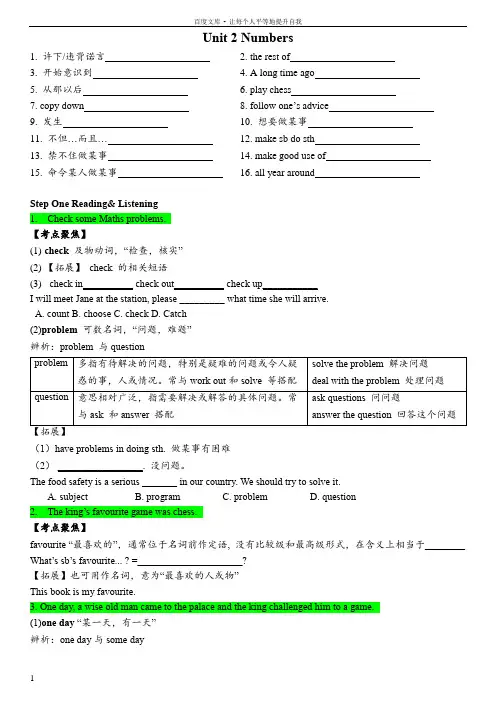
Unit 2 Numbers1. 许下/违背诺言_____________________2. the rest of_____________________3. 开始意识到_____________________4. A long time ago_____________________5. 从那以后_____________________6. play chess_____________________7. copy down_____________________ 8. follow one’s advice_____________________9. 发生_____________________ 10. 想要做某事_____________________11. 不但…而且…_____________________ 12. make sb do sth_____________________13. 禁不住做某事_____________________ 14. make good use of_____________________15. 命令某人做某事_____________________ 16. all year around_____________________Step One Reading& Listening1.Check some Maths problems.【考点聚焦】(1)check 及物动词,“检查,核实”(2)【拓展】check 的相关短语(3)check in__________ check out__________ check up___________I will meet Jane at the station, please _________ what time she will arrive.A. countB. chooseC. checkD. Catch(2)problem可数名词,“问题,难题”辨析:problem 与question(1)have problems in doing sth. 做某事有困难(2)_________________. 没问题。
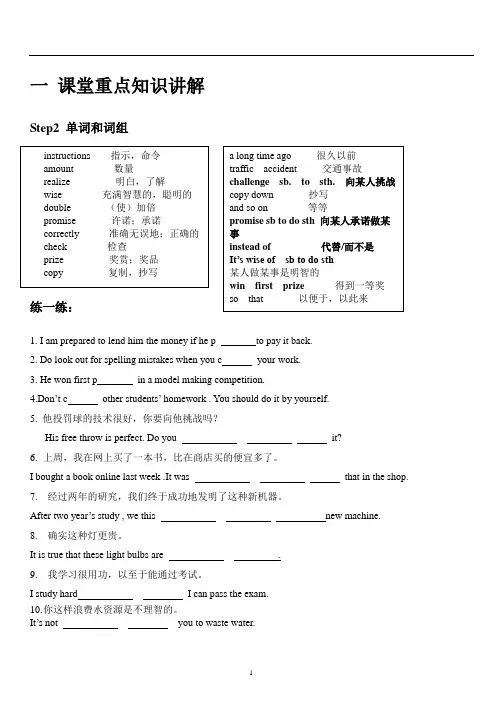
一 课堂重点知识讲解Step2 单词和词组练一练:1. I am prepared to lend him the money if he p to pay it back.2. Do look out for spelling mistakes when you c your work.3. He won first p in a model making competition.4.Don ’t c other students ’ homework . You should do it by yourself.5. 他投罚球的技术很好,你要向他挑战吗?His free throw is perfect. Do you it? 6. 上周,我在网上买了一本书,比在商店买的便宜多了。
I bought a book online last week .It wasthat in the shop. 7. 经过两年的研究,我们终于成功地发明了这种新机器。
After two year ’s study , we this new machine. 8. 确实这种灯更贵。
It is true that these light bulbs are . 9. 我学习很用功,以至于能通过考试。
I study hard I can pass the exam. 10. 你这样浪费水资源是不理智的。
It ’s not you to waste water.Step 2 基数词1.基数词的读法.1)1---12 : one two three four five six seven eight nine ten eleven twelve2)13---19: 词尾加-teen :thirteen fourteen fifteen sixteen seventeen eighteen nineteen3)20,30,40,50,60,70,80,90 : 逢十词尾加-ty :twenty thirty forty fifty sixty seventy eighty ninety4)21----99: 在十位与个位之间加连字符.21--- twenty-one 99---ninety-nine5)101---999 :先说几百, 再加and ,再加末尾两位数或个位数.101---one hundred and one 238----two hundred and thirty-eight6)1000以上的数:先将数字从右往左数,每三位数用一个逗号隔开, 从右往左第一个逗号表示“千”读thousand 第二个逗号表示“百万”读million 第三个逗号表示“十亿”读billion18,657,421---eighteen million ,six hundred and fifty-seven thousand ,four hundred and twenty-one.关于岁数的表达,例如two years old和two-year-old只可以做表语意思是两岁。
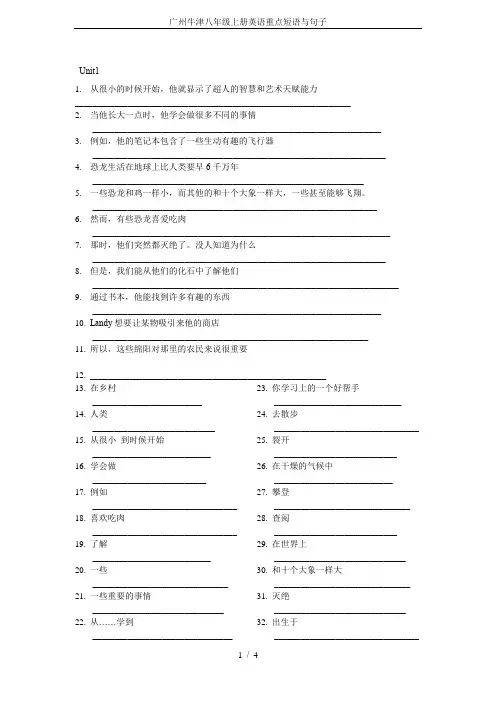
广州牛津八年级上册英语重点短语与句子Unit11.从很小的时候开始,他就显示了超人的智慧和艺术天赋能力_______________________________________________________________2.当他长大一点时,他学会做很多不同的事情__________________________________________________________________3.例如,他的笔记本包含了一些生动有趣的飞行器___________________________________________________________________ 4.恐龙生活在地球上比人类要早6千万年______________________________________________________________5.一些恐龙和鸡一样小,而其他的和十个大象一样大,一些甚至能够飞翔。
_________________________________________________________________6.然而,有些恐龙喜爱吃肉____________________________________________________________________ 7.那时,他们突然都灭绝了。
没人知道为什么___________________________________________________________________ 8.但是,我们能从他们的化石中了解他们______________________________________________________________________ 9.通过书本,他能找到许多有趣的东西__________________________________________________________________ ndy想要让某物吸引来他的商店_______________________________________________________________11.所以,这些绵阳对那里的农民来说很重要12.______________________________________________________13.在乡村_________________________14.人类____________________________ 15.从很小到时候开始___________________________16.学会做__________________________17.例如_________________________________ 18.喜欢吃肉_________________________________ 19.了解___________________________20.一些_______________________________ 21.一些重要的事情______________________________ 22.从……学到________________________________23.你学习上的一个好帮手_____________________________ 24.去散步_________________________________ 25.裂开____________________________ 26.在干燥的气候中___________________________27.攀登_______________________________ 28.查阅____________________________ 29.在世界上______________________________ 30.和十个大象一样大_______________________________ 31.灭绝______________________________ 32.出生于_________________________________33.在……的末尾_______________________________ 34.记得要去做某事____________________________ 35.把它放在窗边_________________________36.大景点___________________________ 37.对某人而言重要________________________________Uint21.很久以前2.下棋3.向某人挑战4.答应某人做某事5.赢得比赛6.一粒大米7.其余部分8.命令某人做某事9.等等10.带领某人11.从那时起12.全年13.发生14.抄写15.听从某人的建议16.除了……意外都没有17.首先18.用这种方法19.不再……20.开始做某事21.以致于22.发展成为23.导致1.很久以前,在印度住着一个国王2.国王向老者承诺,“如果赢得比赛,你可以得到任何的奖赏”3.难道你不想要黄金和白银吗4.国王命令他的手下收集了一袋米5.他在第一个方格上放了一粒米,第二个方格上放了两粒,一次类推6.国王很快意识到问题——即使把全国所有的大米收集起来,他也仍然没有足够的米放在所有的方格上。
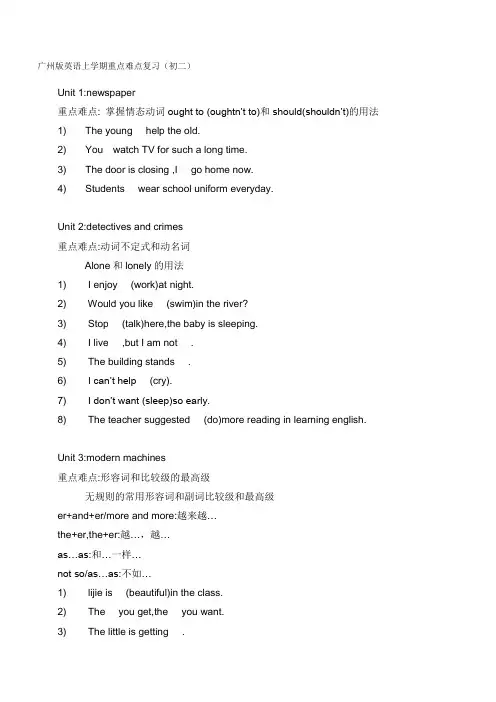
广州版英语上学期重点难点复习(初二)Unit 1:newspaper重点难点: 掌握情态动词ought to (oughtn’t to)和should(shouldn’t)的用法1) The young help the old.2) You watch TV for such a long time.3) The door is closing ,I go home now.4) Students wear school uniform everyday.Unit 2:detectives and crimes重点难点:动词不定式和动名词Alone和lonely的用法1) I enjoy (work)at night.2) Would you like (swim)in the river?3) Stop (talk)here,the baby is sleeping.4) I live ,but I am not .5) The building stands .6) I can’t help(cry).7) I don’t want (sleep)so early.8) The teacher suggested (do)more reading in learning english.Unit 3:modern machines重点难点:形容词和比较级的最高级无规则的常用形容词和副词比较级和最高级er+and+er/more and more:越来越…the+er,the+er:越…,越…as…as:和…一样…not so/as…as:不如…1) lijie is (beautiful)in the class.2) The you get,the you want.3) The little is getting .4) My coat is yours.和你的一样漂亮5) I am you.和你一样高6) This boos is that one.不如…有趣7) I am you are.不如你高Nuit 4:historical stories重点难点:现在完成时:2.时间状语:recently, lately, since…for…,in the past few years, etc.3.基本结构:have/has + done4.否定形式:have/has + not +d one.5.一般疑问句:have 或has。
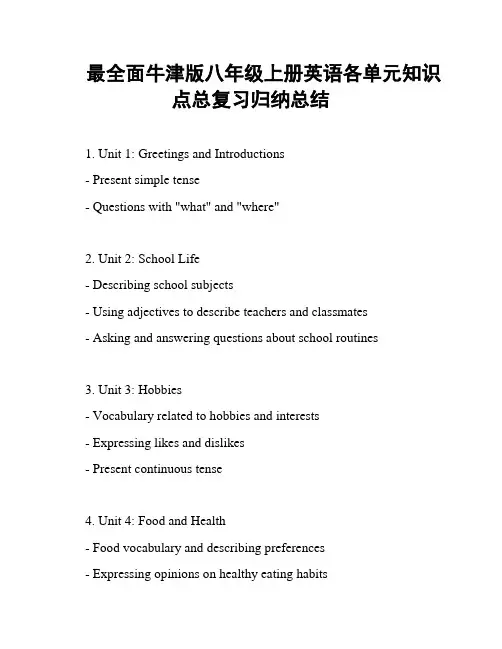
最全面牛津版八年级上册英语各单元知识点总复习归纳总结1. Unit 1: Greetings and Introductions- Present simple tense- Questions with "what" and "where"2. Unit 2: School Life- Describing school subjects- Using adjectives to describe teachers and classmates- Asking and answering questions about school routines3. Unit 3: Hobbies- Vocabulary related to hobbies and interests- Expressing likes and dislikes- Present continuous tense4. Unit 4: Food and Health- Food vocabulary and describing preferences- Expressing opinions on healthy eating habits- Imperative sentences for giving suggestions and instructions5. Unit 5: Holidays and Traditions- Vocabulary related to holidays and celebrations- Describing past events- Using time expressions and prepositions to talk about when and where6. Unit 6: Environment- Vocabulary related to environmental issues- Expressing concerns and suggestions for protecting the environment- Present perfect tense to talk about experiences7. Unit 7: Jobs and Career Choices- Vocabulary related to different professions- Talking about future plans and aspirations- Using "will" and "going to" for future predictions and intentions- Expressing opinions on advantages and disadvantages of technology- Present perfect continuous tense这份文档总结了八年级上册牛津版英语教材各单元的知识点。
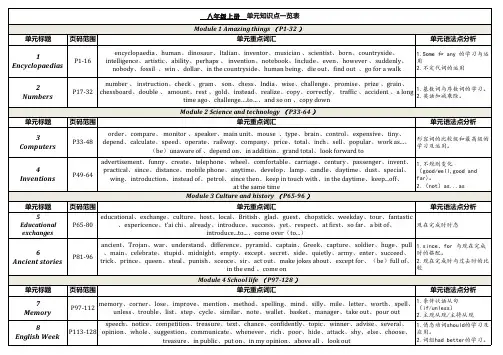
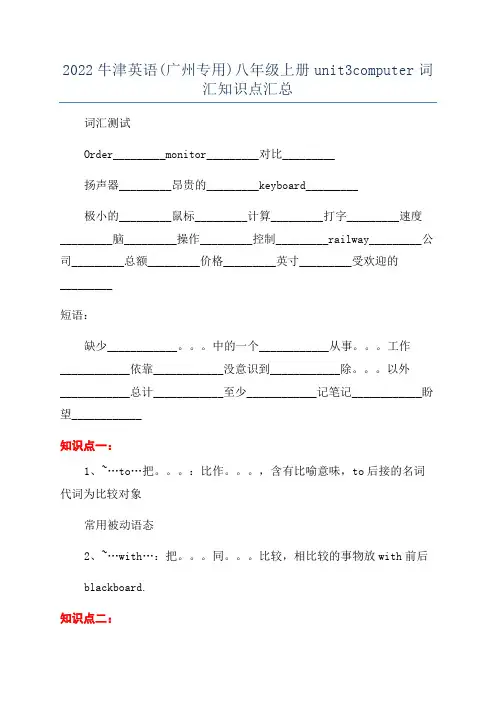
2022牛津英语(广州专用)八年级上册unit3computer词汇知识点汇总词汇测试Order_________monitor_________对比_________扬声器_________昂贵的_________keyboard_________极小的_________鼠标_________计算_________打字_________速度_________脑_________操作_________控制_________railway_________公司_________总额_________价格_________英寸_________受欢迎的_________短语:缺少____________。
中的一个____________从事。
工作____________依靠____________没意识到____________除。
以外____________总计____________至少____________记笔记____________盼望____________知识点一:1、~…to…把。
:比作。
,含有比喻意味,to后接的名词代词为比较对象常用被动语态2、~…with…:把。
同。
比较,相比较的事物放with前后blackboard.知识点二:一、频度副词1.常见的频度副词有以下这些:(画比例图)2.alway(总是,一直)3.uually(通常)4.often(常常,经常)6.never(从不)2.频度副词的位置:a.放在连系动词、助动词或情态动词后面。
如:Davidioftenarrivelateforchool.大卫上学经常迟到。
b.放在行为动词前。
如:Weuuallygotochoolat7:10everyday.我们每天经常在7:10去上学。
3.never放在句首时,主语、谓语动词要倒装。
如:NeverhaveIbeenthere.我从没到过那儿。
二、口诀:分开是一段,相连为某时。
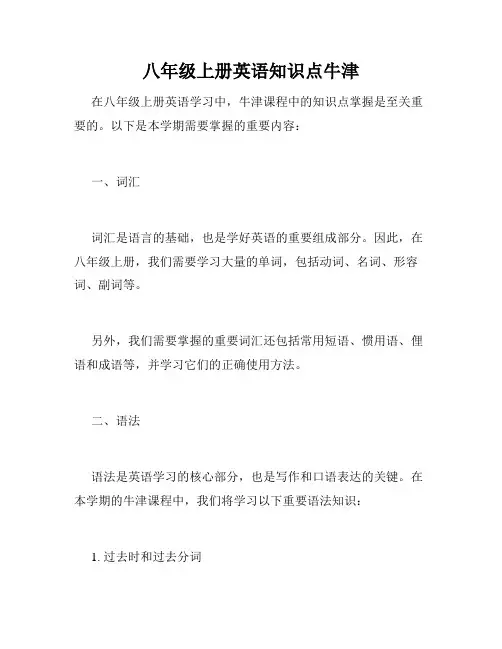
八年级上册英语知识点牛津在八年级上册英语学习中,牛津课程中的知识点掌握是至关重要的。
以下是本学期需要掌握的重要内容:一、词汇词汇是语言的基础,也是学好英语的重要组成部分。
因此,在八年级上册,我们需要学习大量的单词,包括动词、名词、形容词、副词等。
另外,我们需要掌握的重要词汇还包括常用短语、惯用语、俚语和成语等,并学习它们的正确使用方法。
二、语法语法是英语学习的核心部分,也是写作和口语表达的关键。
在本学期的牛津课程中,我们将学习以下重要语法知识:1. 过去时和过去分词2. 现在完成时3. 其他时态4. 主动语态和被动语态5. 祈使句、感叹句和疑问句6. 名词、形容词和副词的比较级和最高级三、听力八年级上册牛津课程的听力训练是非常重要的,我们需要通过听力听懂并理解教师或教材中用英语表述的句子或段落。
为了提高学生的听力技能,牛津课程为我们提供了大量的听力训练。
四、阅读阅读是英语学习的重要环节,它可以提高我们的阅读理解能力和语言水平。
在牛津课程中,我们需要阅读各种文本形式,包括新闻报道、短文、小说等,并进行相关练习。
五、口语和写作口语和写作是英语学习的重点,因为它们是语言实践的两个方面,对于我们来说是必不可少的。
我们需要通过课堂和课外活动提高口语表达和写作能力。
在本学期的牛津课程中,我们将学习如何正确表达想法、描述事物和人物,以及如何编写日记、文章和信件等不同形式的写作。
总而言之,八年级上学期的牛津课程对于我们的英语学习至关重要,我们需要通过认真学习、刻苦实践以及不断提高自己的语言水平,才能在英语学习中重要地步骤上取得成功。
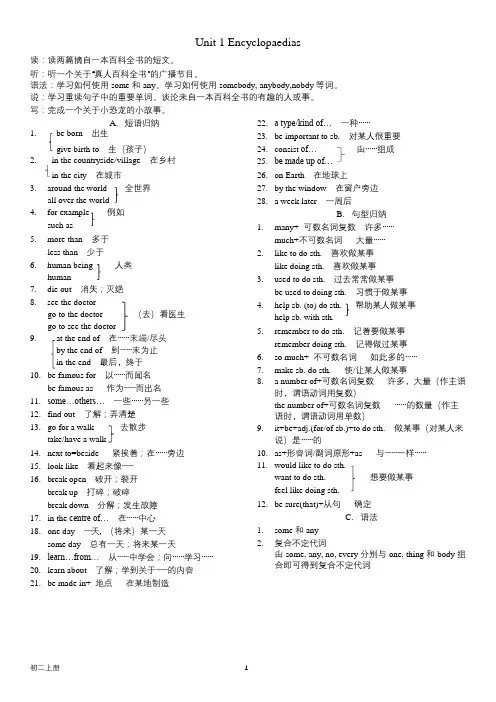
读:读两篇摘自一本百科全书的短文。
Unit 1 Encyclopaedias听:听一个关于“真人百科全书”的广播节目。
语法:学习如何使用some 和any。
学习如何使用somebody, anybody,nobdy 等词。
说:学习重读句子中的重要单词。
谈论来自一本百科全书的有趣的人或事。
写:完成一个关于小恐龙的小故事。
1. be born 出生A.短语归纳22. a type/kind of…一种……23.be important to sb. 对某人很重要give birth to 生(孩子)2.in the countryside/village 在乡村in the city 在城市3.around the world 全世界all over the world4.for example 例如such as5.more than 多于less than 少于6.human being 人类human7.die out 消失;灭绝8.see the doctorgo to the doctor (去)看医生go to see the doctor9.at the end of 在……末端/尽头by the end of 到……末为止in the end 最后,终于10.be famous for 以……而闻名be famous as 作为……而出名11.some…others…一些……另一些12.find out 了解;弄清楚13.go for a walk 去散步take/have a walk14.next to=beside 紧挨着;在……旁边15.look like 看起来像……16.break open 破开;裂开break up 打碎;破碎break down 分解;发生故障17.in the centre of…在……中心18.one day 一天,(将来)某一天some day 总有一天;将来某一天19.learn…from…从……中学会;向……学习……20.learn about 了解;学到关于……的内容21.be made in+ 地点在某地制造24.consist of…由……组成25.be made up of…26.on Earth 在地球上27.by the window 在窗户旁边28. a week later 一周后B.句型归纳1.many+ 可数名词复数许多……much+不可数名词大量……2.like to do sth. 喜欢做某事like doing sth. 喜欢做某事ed to do sth. 过去常常做某事be used to doing sth. 习惯于做某事4.help sb. (to) do sth. 帮助某人做某事help sb. with sth.5.remember to do sth. 记着要做某事remember doing sth. 记得做过某事6.so much+ 不可数名词如此多的……7.make sb. do sth. 使/让某人做某事8. a number of+可数名词复数许多,大量(作主语时,谓语动词用复数)the number of+可数名词复数……的数量(作主语时,谓语动词用单数)9.it+be+adj.(for/of sb.)+to do sth. 做某事(对某人来说)是……的10.as+形容词/副词原形+as 与……一样……11.would like to do sth.want to do sth. 想要做某事feel like doing sth.12.be sure(that)+从句确定C.语法1.some 和any2.复合不定代词由some, any, no, every 分别与one, thing 和body 组合即可得到复合不定代词读:读一个关于数字的故事。
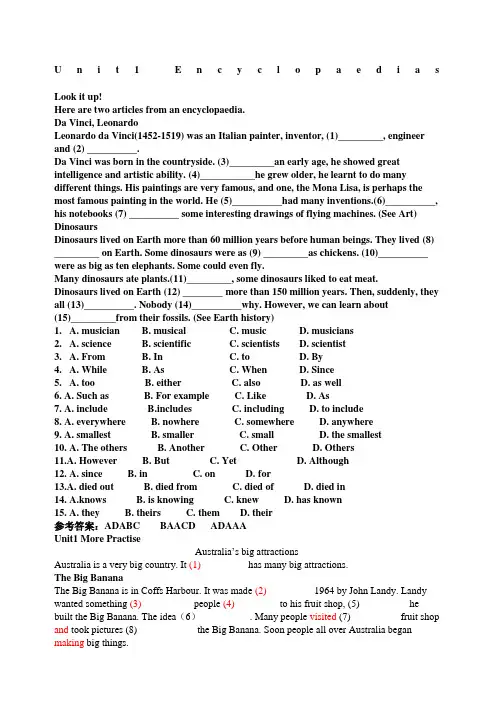
U n i t1E n c y c l o p a e d i a s Look it up!Here are two articles from an encyclopaedia.Da Vinci, LeonardoLeonardo da Vinci(1452-1519) was an Italian painter, inventor, (1)_________, engineer and (2) __________.Da Vinci was born in the countryside. (3)_________an early age, he showed great intelligence and artistic ability. (4)___________he grew older, he learnt to do many different things. His paintings are very famous, and one, the Mona Lisa, is perhaps the most famous painting in the world. He (5)__________had many inventions.(6)__________, his notebooks (7) __________ some interesting drawings of flying machines. (See Art) DinosaursDinosaurs lived on Earth more than 60 million years before human beings. They lived (8) _________ on Earth. Some dinosaurs were as (9) _________as chickens. (10)__________ were as big as ten elephants. Some could even fly.Many dinosaurs ate plants.(11)_________, some dinosaurs liked to eat meat.Dinosaurs lived on Earth (12) ________ more than 150 million years. Then, suddenly, they all (13)__________. Nobody (14)__________why. However, we can learn about(15)_________from their fossils. (See Earth history)1. A. musician B. musical C. music D. musicians2. A. science B. scientific C. scientists D. scientist3. A. From B. In C. to D. By4. A. While B. As C. When D. Since5. A. too B. either C. also D. as well6. A. Such as B. For example C. Like D. As7. A. include B.includes C. including D. to include8. A. everywhere B. nowhere C. somewhere D. anywhere9. A. smallest B. smaller C. small D. the smallest10. A. The others B. Another C. Other D. Others11.A. However B. But C. Yet D. Although12. A. since B. in C. on D. for13.A. died out B. died from C. died of D. died in14. A.knows B. is knowing C. knew D. has known15. A. they B. theirs C. them D. their参考答案:ADABC BAACD ADAAAUnit1 More PractiseAustralia’s big attractionsAustralia is a very big country. It (1)_________ has many big attractions.The Big BananaThe Big Banana is in Coffs Harbour. It was made (2)_________ 1964 by John Landy. Landy wanted something (3)__________ people (4)_________to his fruit shop, (5)__________he built the Big Banana. The idea(6)__________. Many people visited (7)__________fruit shop and took pictures (8)____________the Big Banana. Soon people all over Australia began making big things.The Big MerinoThe Big Merino is in the city of Goulburn. Merinos are a type of sheep. They can (9)_________ in dry weather. Some places in Australia are very dry, so these sheep (10)__________very important (11)____________the farmers there. Inside the Big Merino, there (12)__________a (13)___________museum about the history of wool in Australia. Visitors can also climb up to the Big Merino’s head and look (14)__________the view (15)__________its eyes.B.tooC. eitherD. as well2. A.in B. by C. from D. of3. A. make B. making C. made D. to make4. A.came B. comes C. come D. coming5. A. but B. so C. and D. or6. A. working B. worked C. to work D. works7. A. his B. he C. him D. his’8. A. from B. in C. of D. by9. A. living B. live C. lived D. to live10. A. are B.was C. were D. is11.A. to B. with C. on D. by12. A.was B. is C. were D. are13.A. small B.smaller C. smallest D. the smallest14.A. from B. out C. at D. over15.A. through B.on C. by D. to参考答案:1-5 AADDB 6-10 DACBA 11-15ABACAUnit 8 English WeekEnglish: fun for lifeEnglish Week at Rosie Bridge SchoolLast week, students at Rosie Bridge School worked hard to make their English Week a big (1)_____________.There was (2)_____________ English book fair in the library and a treasure hunt. Some students put (3)____________ an English play. (4)____________ students took part in an English singing competition.There was (5)____________ a speaking competition. The students had to speak on a topic in English (6)_____________two minutes.We spoke to the winner, Henry. “I’m (7)____________happy that I won,” he said. “I advise people (8)_____________slowly. If they want to be good public speakers, they’d better speak (9)_____________and confidently.”We also spoke to several other students about English Week. One of them (10)____________Amy.“I really enjoyed English Week. It gave me a chance to learn new words. In my opinion, every school should have an English Week. It’s well worth(11)___________,” she said.On the last day of English Week, the head teacher gave a (12)___________to the whole school. He gave students some (13)___________on how (14)___________ their English. “You should communicate in English with your friends (15)___________ you can. You should read English books and magazines, and watch English television programmes. Above all, you should enjoy English!” he said.1. A. successful B. succeed C. successfully D. success2. A. an B. the C. \ D. a3. A. on B. in C. with D. by4. A. Others B. Other C. The other D. The others5. A. also B. too C. either D. as well6.A. for B. since C.in D. with7.A. such B. very C. too D.so8.A. speaking B. spoken C. spoke D. to speak9. A. clear B. clearly C. clearer D. more clearB. wereC. wasD. are11.A. doing B. do C. done D. did12.A. speech B. speaking C. spoke D. speak13.A. suggest B. suggestions C. suggested D. suggesting14. A. to improve B. improvement C. improved D. to improve15. A. whenever B,whatever C. however D. wherever参考答案:1-5 DAABA 6-10ADDBC 11-15 AABAAUNIT 8More practiceRobin Hood and Prince JohnPrince John has caught Maid Marian and has set a trap for Robin Hood.Inside Prince John’s castle.Prince John:Now tell me, where’s Robin Hood hidingMaid Marian:Never! Robin Hood will come and rescue me.Prince John:There’s no way Robin Hood can get past my guards. Soon Robin Hood will be mine!Robin Hood enters.Robin Hood:Did somebody call my nameMaid Marian: Robin Hood! I knew you’d come!Prince John:Guards! Capture him!Robin Hood:It’s a trap!The first guard takes RobinHood’s arms from behind and the second guard tries to hit him. Robin Hood ducks and the second guard hits the first guard in the head. The two guards then start fighting.Prince John:Foolish guards!Robin Hood pulls out a sword.Robin Hood:Now you’re mine, Prince John! This castle and all your gold now belong to the poor!Maid Marian:Thank you for saving me, Robin Hood!B.tooC. eitherD. as well2. A.in B. by C. from D. of3. A. make B. making C. made D. to make4. A.came B. comes C. come D. coming5. A. but B. so C. and D. or6. A. working B. worked C. to work D. works7. A. his B. he C. him D. his’8. A. from B. in C. of D. by9. A. living B. live C. lived D. to live10. A. are B.was C. were D. is。
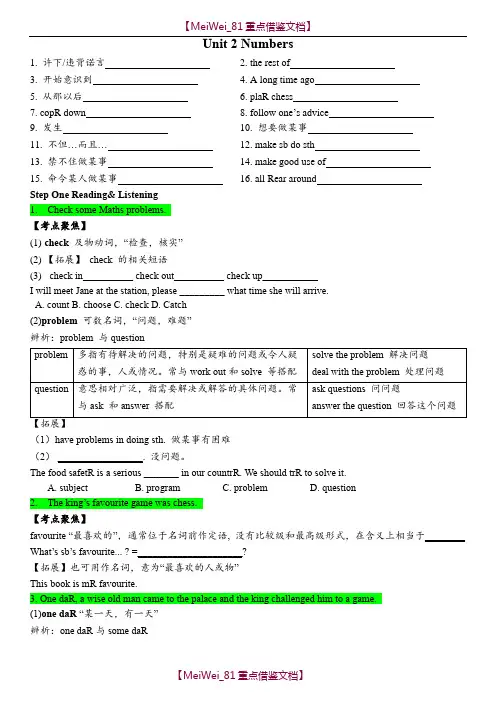
Unit 2 Numbers1. 许下/违背诺言_____________________2. the rest of_____________________3. 开始意识到_____________________4. A long time ago_____________________5. 从那以后_____________________6. plaR chess_____________________7. copR down_____________________ 8. follow one’s advice_____________________9. 发生_____________________ 10. 想要做某事_____________________11. 不但…而且…_____________________ 12. make sb do sth_____________________13. 禁不住做某事_____________________ 14. make good use of_____________________15. 命令某人做某事_____________________ 16. all Rear around_____________________Step One Reading& Listening1.Check some Maths problems.【考点聚焦】(1)check 及物动词,“检查,核实”(2)【拓展】check 的相关短语(3)check in__________ check out__________ check up___________I will meet Jane at the station, please _________ what time she will arrive.A. countB. chooseC. checkD. Catch(2)problem可数名词,“问题,难题”辨析:problem 与question(1)have problems in doing sth. 做某事有困难(2)_________________. 没问题。
8B U1-2知识要点归纳一、重点单词(词性变化)1.permission (n.)准许permit (v.) 准许permitted(过去式)2.disabled (adj.) 有缺陷的disable (v.) 使残废disability (n.) 残疾able (adj.)有能力的ability (n.) 能力3.teenager (n.) 青少年teenage (adj.)青少年的4.illness (n.) 病ill (adj.)生病的5.serious (adj.)严肃认真的seriously (adv.)严肃地,严重地anize (v.)组织organizer (n.)组织者organization (n.)组织7.expression (n.)表达express (v.)表达8.pain (n.)痛苦painful (adj.) 痛苦的9.friend (n.) 朋友friendship (n.) 友谊10.difficulty (n.) 困难difficult (adj.)困难的11.joy (n.) 愉悦joyful (adj.) 愉悦的12.peace (n.)平静peaceful (adj.)平静的13.hurt (v.) 受伤hurt (过去式,过去分词)14.courage (n.) 勇气courageous (adj.) 勇敢的encourage (v.)鼓励15.pay (v.)付费paid ( 过去式,过去分词)16.voluntary (adj.) 义务的volunteer (n.)志愿者munication n. 交流- communicate v. 交流18.accept v. 接受- acceptance n. 接受19.cross v. 横穿过– across prep. 横穿过20.appear v. 出现– appearance n. 外貌–反义词:disappear v. 消失21.impress v. 印; 给…以深刻印象– impression n. 印象22.hold v. 容纳; 拿住,握住; - 过去式/过去分词held / held23.shake v. 动摇; 摇头; - 过去式/过去分词shook/ shaken二、同义词(同义词组)1.illness=sickness 病2.raise=put up 举起/collect筹集/ ask问/make...higher提高3.ill=sick/in bad health 生病的4.serious=bad or dangerous 严重的5.difficulty=trouble困难6.alone=by oneself/on one’s own 独自7.joy=happiness/pleasure 愉快,喜悦8.give sb. a hand=help sb.帮助9.look after=take care of 照顾10.peace=not worried or excited/quiet 平静的11.continue=go on 继续12.teenager=a person who is between 13 and 19 years old 青少年13.express=to show what you think or feel. 表达14.in order to为了= so as to ….为了15.take place 发生= happen 发生16.remind sb. about sth. 提醒某人某事= help sb. remember三、重点短语1.in need 需要帮助的2.offer to do sth. voluntary work主动提出做义务工作3. a painting competition绘画比赛4. a girl called Cindy 一个叫Cindy的女孩5.teach them to tell stories教他们讲故事6.die in a car accident在一场车祸中丧生7.continue to do sth. 继续做某事8.have difficulty (in) doing sth. 做某事有困难9.raise one’s spirits 使振奋,使鼓起勇气10.have lots of courage 有很大的勇气11.take photos of 给...拍照12.in hospital 住院in the hospital 在医院13.pay...for 为....而付款14.ask permission 报请批准15.give sb. permission to do sth.给某人做某事的许可16.express one’s feeling 表达感情17.aged from...to.... 年龄从...岁到...岁18.be unable to do sth. 无法做某事19.attend school 上学20.suffer from因……受苦21.body language身势语22.sit up 坐直23.make a good impression on sb. 给某人留下好印象。
八年级上册复习资料第一部分钻石100句1. There is nothing in the bottle. It is empty.2. He did not really lose his wallet. That was just a trick.3. --Can you spell this word for me?-- Of course. L-O-C-A-L.4. The teacher asked us a question yesterday, but nobody could answer it.5. My parents want me to be a pianist. However, I want to be a doctor.6. She won the match. All the students felt happy for her.7. Lucy ’ s hobbies include swimming and dancing.8. Our teacher asks us to invent something green in the Science Festival.9. It ’ s wise of you to stay away from the danger.10. The old man didn ’ t realize his mistake until his wife told him.11. There was a huge stone in this square , but nobody knew how ancient people moved it to this place.12. When the traffic light is red, you must stop your car.13. I don't want to go out today. I just want to stay at home instead.14. He took two of the candies and gave the rest to others.15. The price of the bag is 180 yuan. It is so expensive.16. My grandpa likes to play chess so I bought him a chessboard last year.17. Many young people like to order things on the Internet on November 11 every year.18. Miss White is a popular teacher. Many students like her very much.19. He was so poor those years that he had to sell his house to get money.20. These ants are so tiny that people are always unaware of them.21. The books by Mark Twain are worth reading.22. Use your brain, and then you will have new ideas.23. The cartoon was so funny that it made all of us laugh happily.24. Mark Twain is one of the most famous writers in the nineteenth century.25. He likes science very much and he wants to be a scientist when he grows up.26. We must develop a new method to finish the work.27. The sofa is so comfortable the kids like to lie there28. When we arrive in a new place, we had better know something about the local cultu.re29. I stayed with a host family when I was in America.30. We should respect old people in our daily life.31. I ’ m vergylad to hear that you are getting better.32. I tried to learn to speak French, but I didn't have much success. It was really difficult for me.33. Many people will come to our party and the most important guesits Mr. White.34. His home is on the other side of the river.35. As middle school students, we have to wear uniforms on weekdays when we go to school.36. You will get wet in a rainy day unless you take an umbrella with you.37. We should check the answers carefully before we hand in our homework .38. To open the door, you should pull it instead of pushing it.39. The stone is so huge that nobody can move it.40. Before you enterthe teachers ’ office, please knock at the door.41. However, she says people should not lose heart.42. It is very silly to make the same mistake again and again.43. My mother often makes a list before going shopping.44. David is so rich that he can buy anything he wants.45. I like both of the dresses. I don ’ t know whhoiocsheo. ne to c46. If you travel to England, it will be a good chance for you to practise your spoken English.47. When you are giving a speech, you should speak clearly enough for everyone to understand you.48. Tony wants to tour around our city this weekend.49. I have already cleaned all the rooms in the house. Look, The rooms are all clean.50. The new car can reach a high speed of 400 km/h.51. Yao Ming was born on September 12th, 1980 in Shanghai.52. It ’ s good for usgto for a walk after meals every day.53. This film is not as interesting as that one.54. Dinosaurs died out tens of millions of years ago.55. Can you help me find out who took my book away?56. Some students were in the classroom The others went to the library57. I challenged him to a tennis game58. A long time ago, lots of people lived on the island59. This shop sells clothes, shoes, hats and so on60. Tim only spent half an hour on his homework yesterday61. I f I am free tomorrow, I will go to the zoo with you62. He promised to lend me his bike63. She made a shopping list so that shwe ouldn ’ t forget anything64. Miss Li told us to copy down the new words65. John always make joke about other classmates It is impolite66. His father works as a doctor in the hospital67. In addition, Mr Li is very good at drawing68. She is much happier than before in her new school69. As time goes by, the little tree is growing taller and taller70. He is one of the best boys in his class71. I n my opinion,you’ d better not swim in the river72. So far, he has read a lot of books73. The gloves can keep your hands warm74. This dress cost me as much money as that one75. What a good invention the Internet is!76. Lily has never seen a film at the cinema so far77. She was a little afraid at first78. Have you ever been to the Moon?79. My mother just gives me a bit of pocket money every month80. The winter holiday is coming He is looking forward to travelling abroad81. T hey will come over to the UK next month82. Your article is very good, except for some spelling mistakes83. In the end, all the students passed the exam84. I ’ m not going to speak about it in public85. The teacher asked the students to act out the drama86. The teacher talked to the students one by one to encourage them87. Last night ,the army was under attack.88. You had better have a rest.89. I hope we can still keep in touch with each other after leaving school.90. My English teacher gave me some good advice on how to learn English better.91. The dinosaurs used to live happily on Earth.92. Training isn't the same thing as education.93. My mother seldom sleeps in the daytime.94. Since then, we have never left here.95. I have read more than 200 books since I was ten.96. Now children can learn about dinosaurs in museums.97. My brother showed great interest in music from an early age.第二部分书面表达书面表达(一)最近学校推广英语阅读周,你向同学们推荐大英百科全书,请根据表格内容提示, 完成一篇书目推荐的文章。
八年级上册牛津英语知识点八年级上册的牛津英语,是英语学习的一个重要阶段。
在这一阶段,学生需要掌握一定的语法、词汇、阅读技巧等知识点。
本文将从这几个方面来讲解八年级上册牛津英语的知识点。
一、语法1.一般现在时与现在进行时一般现在时用于描述客观事实或习惯性的动作,例如:“The sun rises in the east.”(太阳从东边升起。
)。
现在进行时用于描述正在进行的动作,例如:“I am studying English now.”(我正在学习英语。
)。
2. 一般过去时与过去进行时一般过去时用于描述过去发生的动作或状态,例如:“I went to Beijing last week.”(上个星期我去了北京。
)。
过去进行时用于描述过去某一时刻正在进行的动作,例如:“I was watching TV when the phone rang.”(电话响的时候我正在看电视。
)3. 现在完成时现在完成时用于描述过去发生的动作对现在造成的影响或结果,例如:“I have finished my homework.”(我已经完成了作业。
)二、词汇1. 认知词汇在八年级上册的牛津英语中,我们需要掌握大量的认知词汇,例如:“cell phone”(手机)、“internet”(互联网)、“computer”(电脑)等。
2. 时态动词在学习语法的同时,我们也需要掌握各种时态的动词,例如:“go”(一般现在时:go 学生, go to school)、“went”(一般过去时:I went to the park yesterday.)、“have gone”(现在完成时:I have gone to the park.)、“is going”(现在进行时:He is going to school.)、“was going”(过去进行时:I was going to school when it rained.)等。
最新牛津版英语八年级上册知识点总结
(精编版)
本文档总结了最新牛津版英语八年级上册的重要知识点,以帮
助学生复和理解课程内容。
以下是一些主要知识点的概述:
1. 语法知识点
- Simple Present Tense: 描述惯、日常活动和客观事实。
- Present Continuous Tense: 描述正在进行的动作和当前的状态。
- Past Simple Tense: 描述过去发生或完成的动作或状态。
- Present Perfect Tense: 描述经验、对过去发生事情的补充说明。
- Modal Verbs: 表示能力、愿望和建议的动词。
2. 词汇知识点
- 常用动词短语和短语动词的用法。
- 常见的形容词、副词以及它们的用法。
- 重要的名词和名词短语,包括人物、地点和事物等。
- 常用的连词和连接词,用于连接句子和段落。
3. 句型和对话
- 各种常用句型和语法结构的用法。
- 与日常生活相关的对话和交流技巧。
- 谈论个人信息、兴趣爱好、家庭和学校生活的对话。
4. 阅读理解和写作技巧
- 阅读理解技巧,如根据语境猜词义、寻找关键信息等。
- 写作技巧,如写作日记、书信、简短文章等。
- 常见写作句型和表达方式,以及一些写作练。
5. 其他知识点
- 英语语音和发音规则。
- 一些常见的语言交际惯和文化背景知识。
以上只是对知识点的简要总结,建议学生根据自身情况进行针对性的复习。
更详细的知识内容可参考最新牛津版英语八年级上册教材。
祝学习顺利!。
沪教牛津版八年级上册英语知识点总结全册(广州地区)Unit 1 Encyclopedias (4)✧单词 (4)✧短语 (5)✧重点句型 (5)✧课文翻译 (6)✧知识点解析 (7)✧习题 (13)Unit 2 Numbers (16)✧单词 (16)✧短语 (17)✧重点句型 (18)✧课文翻译 (18)✧知识点解析 (19)✧习题 (36)Unit 3 Computers (38)✧单词 (38)✧短语 (39)✧重点句型 (39)✧课文翻译 (40)✧知识点解析 (41)✧习题 (58)Unit4 Inventions (61)✧单词 (61)✧短语 (62)✧重点句型 (63)✧课文翻译 (63)✧知识点解析 (65)✧习题 (68)Unit5 Educational exchange (71)✧单词 (71)✧短语 (72)✧重点句型 (72)✧课文翻译 (73)✧知识点解析 (74)✧习题 (83)Unit 6 Ancient stories (85)✧单词 (85)✧短语 (87)✧重点句型 (87)✧课文翻译 (88)✧知识点解析 (89)✧习题 (95)Unit 7 Memory (100)✧单词 (100)✧短语 (101)✧重点句型 (101)✧课文翻译 (102)✧知识点解析 (103)✧习题 (109)Unit 8 English Week (114)✧单词 (114)✧短语 (115)✧重点句型 (115)✧课文翻译 (116)✧知识点解析 (117)✧习题 (122)每单元必考语法点预览Unit 1 some与any的用法& 复合不定代词somebody, anybody, nobody等的用法Unit 2基数词及数字的表达& 序数词Unit 3形容词的比较级与最高级Unit 4 good, bad, far & (not) as…as…Unit 5现在完成时& already, yet, ever, neverUnit 6 现在完成时中since, for & 现在完成时与一般过去时的区别Unit 7(真实性)条件状语从句& if…not 与unlessUnit 8情态动词should, had betterUnit 1 Encyclopedias 单词suddenly adv. [ˈsʌdn:lɪ] 意外地,忽然地nobody pron. [ˈnoˌ bədi] 没有人,无人fossil n. [ˈfɑsəl] 化石win v [wɪn] 获胜,赢dollar n [ˈdɑlɚ] 美元✧短语1.in the countryside 在乡村,在农村11.for example 例如2.human being 人12.next to 紧挨着3.die out 灭绝,消失13.look up 查阅4.find out 了解,弄清14.live on Earth 生活在地球上5.go for a walk 去散步15.an Italian painter 一位意大利画家6.be born 出生ed to do sth 过去常常做某事7.more than 多于,超过17.at the end of 在…末尾8.just like 正如,正像18.in the centre 在中心9.how long 多久e out of…从…出来10.would like 想要20.be famous for 以…而闻名✧重点句型1.Some dinosaurs were as small as chickens. 有的恐龙和鸡一样小。
Unit 1 Encyclopaedias1. ____________________在农村2. human being _____________________3. _____________________消失,灭绝4. go for a walk_____________________5. _____________________因…而著名6. for example _____________________7. ______________________在…末尾8. used to do sth____________________9. ______________________出生在某地10. look up____________________11. _____________________长大12. remember to do sth____________________ Getting readylook up 为固定搭配,意为“(在字典、参考书中)查找”,后接名词或代词作宾语,look up后若跟代词作宾语,代词应放在look 和up之间。
短语:look up……in…… 在……中查找……Eg: You can_________ his telephone number in the telephone book.If we don’t know how to use a word, we can___________ in a dictionary.【同类归纳】look的其他常用短语look at____________ look for____________look after____________ look over____________look like____________ look through____________born (动词;形容词)__________短语:be born in+______ 出生在 ……be born on +______ 出生在 ……be born of+_______ 出生于….Eg: She _____________ China on September 23.3. include (动词)___________指在一个整体中包括了其中一部分内容或项目,强调包含的部分。
文档来源为:从网络收集整理.word版本可编辑.欢迎下载支持. 1文档收集于互联网,已整理,word版本可编辑. 广州八年级英语(上册)主要知识点 Unit 1 Newspapers1.Useful phrases and expressions Take charge of 主管,掌管 Vote for …投赞成票 Take note 记录 Be responsible for 负责,有责任 Talk ....over 详谈 Make a list of .....把…列成清单 Be free for (someone) 对(某人)免费 Pay....for 付费 Make a decision about.... 对…作出决定 In one week's time 一周后 A copy of 一份 For free 免费 From the air 从空中 Of one's own 某人自己的 Have the habit of.... 有…的习惯 Try one's best 尽力 Try to (do something) 尽力(做某事) Try doing something 尝试做某事 Believe in oneself 相信自己 Once a week 每周一次 Be pleased with.... 对…满意 Keep fit 保持健康 Have a high fever 发高烧 At break 课间休息 Not at all 一点也不,完全不 Get on well 相处得好 For this reason 因为这样
2.语法language: should and ought to (positive)
should not and ought not to (negative) 3.辨析 3.1 Other, the other, another (1) Other 表示泛指,没有特定的范围。 E.g. Lei Feng always helped other people. (2) The other 意为“另一个”,一般用于两者之间。其句型为:one...the other...(一个…另一个…) E.g. The old man has two sons. One is a soldier, the other is a worker. (3) another 表示三者或者三者以上的其他任何一个。意为“再一;又一”。 E.g. Would you like another cup of tea? 注意: the other 和other 后均可加名词,但是意思有所不同,“the other+名词”表示一定范围内出一部分外其余的全部,而"other+名词"表示出去部分以后的另一些,但不是剩下的全部。
3.2 Spend, cost, take, pay “花费”
A. spend 主语必须为人,常用于一下结构: (1) spend time/money on sth. 在某物上花费时间、金钱。 E.g. I spend two hours on this maths problem. (2) spend time/ money (in) doing sth. 花费时间、金钱做某事。 E.g. They spend two years (in) doing this bridge. (3) spend money for sth. 花钱买某物 E.g. His money was spent for books. 文档来源为:从网络收集整理.word版本可编辑.欢迎下载支持. 2文档收集于互联网,已整理,word版本可编辑. B. cost 的主语是物或者某种活动,还可以表示“值”,常见的用法如下: (1) sth. cost (sb.)+金钱表示“某物花了(某人)多少钱”。 E.g. A computer costs a lot of money. (2) (doing) something cost (sb.) +时间表示“(做某事)某物花了(某人)多少时间。” E.g. Remembering these new words cost him a lot of time. C. take 后面常跟双宾语,常见的用法如下: (1) it takes sb.+时间+ to do sth. 做某事花费了某人多少时间。 E.g. It took them three years to build this road. (2) doing sth. takes sb.+时间表示“做某事花了某人多少时间”。 E.g. Repairing this car took him the whole afternoon. D. pay 的基本用法: (1) pay (sb.) money for sth. 付钱给某人买某物。 E.g. I have to pay him two dollars for this bread. (2) pay for (sth.) 付某物的钱。 E.g. I have to pay for the lost book. (3) pay for sb. 替某人付钱。 E.g. Don't worry. I will pay for you. 3.3 till, until 两者都可以用作介词和连词,也都可以用于肯定句和否定句中。Till 比 until 的语气轻,一般不放在句首。 3.4 ago, before. Ago 表示从现在算起一段时间“以前,”和动词的一般过去式连用。放在所修饰词后面。 E.g. I knew him many years ago. Before 用于表示从过去的某时算起若干时间以前,通常与动词的完成时连用。 E.g. I have never heard of her before. 3.5 Alone 与lonely Alone 独自一人,充当标语形容词(不作定于用)。 充当状语。 E.g. She lives alone in the house. Lonely 孤独的,指心理上的愁闷。可作表语和定语。 E.g. He doesn't fell lonely. 4. 知识点拓展: 4.1 agree with sb. 表示“同意某人或者某人所说的话”。 E.g. He agree with me. agree to +表示“建议,计划,办法”的词 E.g. He agreed to our suggestion. agree on+ 表“具体协商的文件,计划”等 E.g. We agree on the plan. agree to do sth. 同意做某事 E.g. We agree to go swimming. 4.2 leave 的用法: leave 作动词,表示“留下,丢下” , 英语中表示“把某物遗忘在某处”常用“leave+某物+地点”。 文档来源为:从网络收集整理.word版本可编辑.欢迎下载支持. 3文档收集于互联网,已整理,word版本可编辑. E.g. He left his key at home. 4.3 as well as 的用法: as well as 而且,还,也 as well as 可以用来连接两个相同的成分,如名词,形容词,代词,介词,此时虽然连接的是两个并列成分,但是强调的重点在前面不在后面。意思为:“不但…而且” “既…又”, “除了…之外,还有…” 。 翻译时要先译后面再译前面。 E.g. Living things need air and light as well as water. 生物不仅需要水,还需要空气和阳光。 as well as 还用于同级比较 注意: as well “也”,一般用于肯定句句末,相当于"too"。 4.4 much too 与 too much much too “太”,副词短语。 too much “太多”形容词短语。 E.g. He felt much too tired because he has too much homework.
Unit 2 detectives and crimes
1. Useful phrases and expressionsThe same ...as..和…同样的… No longer 不再 Break into 强行闯入 Go to jail 进监狱 Instead of 代替…, 而不是… Behind bars 坐牢 At the back of ....在…的后部 At the front of ....在前部 Go in 进入室内 Refuse to do sth.拒绝做某事 Bump into someone/something 碰撞到某人、某物 take away 带走,拿走 Get away 逃离,脱身 At the time of ...在…期间 Say goodnight to someone 向某人道晚安 Knock at 敲,击 Break...down 打到 From a distance 从远方,从远处 In addition to 除…以外 Kill oneself 自杀 Lose money 输钱 Be angry with someone 生某人的气2.语法Language :infinitives(动词不定式)gerunds (动名词) 不定式充当句子各种成分的具体用法: 2.1 不定式作主语: (1)动词不定式放在句首作主语,表示某个具体或将来的动作。 E.g. To swim in the river is dangerous. (2)在现代英语中为了平衡句子,常用it 作形式主语,而把真正作主语的不定式放在后边。 E.g. It is dangerous to swim in the river. (2)在(1)的情况下,可以用介词for 或of 来引出动词不定式的逻辑主语。 E.g. It is difficult for the foreigners to learn Chinese. 2.2 不定式作宾语: (1)动词不定式可以作某些动词的宾语,表示具体的动作或行为。 E.g. I can not afford to buy a new car.